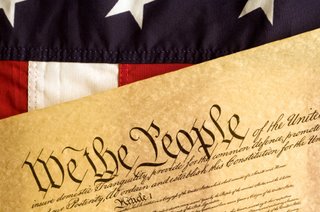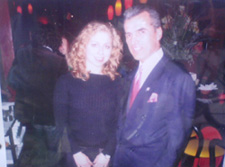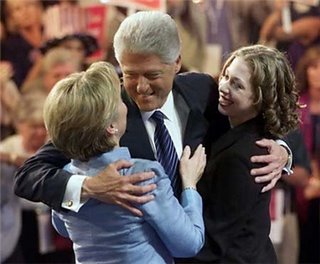 Public Citizen wants to be sued. Really. They asked for it.
Public Citizen wants to be sued. Really. They asked for it.
Some lawyer at an outfit calling itself Dozier Internet Law sent a cease and desist letter on behalf of one of its clients, along with this threat:
Please be aware that this letter is copyrighted by our law firm, and you are not authorized to republish this in any matter. Use of this letter in a posting, in full or in part, will subject you to further legal causes of action.
Right. So Public Citizen, after publishing the entire letter on its website, tossed down the gauntlet on behalf of their client with this repsonse:
By this letter, we are inviting you to test the validity of your theory that the writer of a cease and desist letter can avoid public scrutiny by threatening to file a copyright law suit if his letter is disclosed publicly on the internet.
The writer of the original letter, Donald Morris, seems to have clearly done his client a grave disservice with this stupidity. (I mentioned this the other day in my personal injury law round-up, but thought this chuckleheaded conduct needed its own post.) Perhaps his threats have succeeded before, but the result is that the letter, and the claims against his client, are now being re-broadcast across the internet.
And what was the dispute about? Seems his client is a company called DirectBuy, and it has been the subject of negative reviews from contributors to a couple websites. Whether the claims are true or not I have no way of knowing, but now there are certainly more people discussing whether their client, DirectBuy, is a a scam or a rip-off and wondering if they should stay away from them.
Public Citizen, by the way, isn’t the only one who wants to be sued. The full text of the letter can be found at tdaxp.com, and I hate Linux published this Don’t Forget To Sue Me Too demand:
Well hot damn… I think I just violated their copyright as well… and of course for such threats to be meaningful… they have to be willing to make good on them.
With that said… I hereby demand that you Mr. Morris immediately file a copyright infringement suit against Mr. Leonard in this matter and name me as a co-defendant for my blatant disregard for your copyrights in my reproduction of parts of your letter that is marked as “for negotiation and settlement purposes only,” not to mention hosting a full copy of it here, as well as all other persons and groups who reproduced, hosted, discussed, read or thought about any part of this letter.
This blog post puts you on notice that should you refuse to comply with our demands by October 15, 2007, I will have no choice but to recommend that the blogosphere pursue all legal causes of action, including the further reproductions of your letter, to protect its interests and that of all free people in this country who may wish to express an opinion you or your client may not agree with.
Considering that Dozier Internet Law brags that they are “The Lawyers for Internet Business,” they sure did a great job of tripping over their own feet.
And then there is this boast from their site:
John Dozier was interviewed for the news report below in Silicon Valley in August, 2007 and Youtube recognized it with a “most linked to” honor
OK, so now they have another link. Though it might not be what they wanted. And I suspect they’ll get a few more.
[Addendum: More on Dozier v. Public Citizen, and Potential Legal Malpractice]
——————————————————————————-
(Eric Turkewitz is a personal injury attorney in New York)
Links to this post:
infomercialscams.com owner harrased by an attorney from the dozier …
here’s an example of a company and law firm of trying to suppress free speech by using outlandish claims and a variety of threats. if you live in direct buy’s market, you’ve seen their infomercials on your local television station. …posted by amexsux @ January 07, 2008 2:31 PM
2007 dozier internet law google rankings – week 7
dozier continues to throw cash at spam advertising — doorway pages, theory pants, and the rest — in order to prevent googlers from finding out information about the company. still, the fact that some of the spam pages are very, …posted by [email protected] (Dan tdaxp) @ November 28, 2007 12:00 PM
“scofflaw bloggers:” the dozier taxonomy of wicked netizens
dozier internet law is a “cyber law firm”that specializes in litigation related to the internet. for background, see the cuppy’s coffee and directbuy case studies. however, as “cyber lawyers” the guys at dozier clearly pay a lot of …posted by [email protected] (Dan tdaxp) @ October 23, 2007 11:20 PM
Dozier Internet Law: Toothless Cowards?
It’s now been nearly 2 weeks since I demanded that Dozier Internet Law file suit against me for my alleged copyright infringement in republishing part of the full text of their C&D letter directed to Infomercial Scams. …posted by Brendan @ October 21, 2007 3:29 PM
dozier: the cybertrolllawyer firm
a magyar “internetjogászokról” szoktam rendszeresen szépeket irogatni ide, de közel sem magyar sajátosságról van szó. külföldön is megjelentek már egy ideje az internetspecialisták, akiknek sokszor lövésük sincs az egészről. …posted by Caracalla @ October 19, 2007 3:02 PM
dozier internet law: a vector for viruses?
dozier internet law (a firm that engages in strategic lawsuits against public participation — see case studies on cuppy’s coffee, directbuy, and inventor-link) is attempting to prevent users from examining code that dozier executes on …posted by [email protected] (Dan tdaxp) @ October 19, 2007 8:05 AM
how not to write a cease-and-desist letter: comparing the dozier …
do you want to have your reputation ruined, pay a million dollar fine, and in general tick everyone off? if so, dozier internet law is the law firm for you! but if the thought of being in the presence of “super lawyer” john “bull” …posted by [email protected] (Dan tdaxp) @ October 16, 2007 8:26 AM
beyond the gates of bizarro land
if you had any doubt about the good sense of dozier internet law, read this comment. here’s the first paragraph: first, you seem to think that us law will govern this copyright matter. it likely will not. …posted by [email protected] (Dan tdaxp) @ October 15, 2007 3:50 PM
the daily memo – 10/15/07
“does the supreme court still matter?” (time). my, justice scalia, what a large gavel you have! (supreme dicta). a texas personal injury lawyer has started running tv adds questioning the credentials of a competitor pu lawyer. (law.com) …posted by Seth @ October 15, 2007 2:40 PM
blawg review #130
northern hemisphere edition of blawg review #130 welcome to blawg review #130 — the northern hemisphere edition! this is part 2 of a globe-trotting edition of blawg review, the weekly review of legal blogging hosted each week by a …posted by Diane Levin @ October 15, 2007 12:01 AM
practical blawgosphere: the dozier demand scam
while this has floated around blawgs as the joke of the week, i wanted to make sure that my amigos in the practical blawgosphere were alerted to the dozier demand scam, as noted by my good buddies, the turk at new york personal injury …posted by SHG @ October 14, 2007 4:45 AM
Dozier Internet Law: Running an extortion racket?
When thinking about the ongoing dispute over the unprofessional actions of Dozier Internet Law… I think back to an old Monty Python episode and the the army protection racket sketch: Dino: Oh see my brother’s clumsy colonel, …posted by Brendan @ October 13, 2007 1:49 AM
ars doziera
ars technica, a popular website on the technical arts that includes breaking news, user forums, and other features, prominently features the dozier internet law / directbuy scandal by comparing it to another bizarre lawsuit. …posted by [email protected] (Dan tdaxp) @ October 12, 2007 10:55 AM
nastygram: don’t you dare post this nastygram on the web
ted has briefly mentioned (oct. 8) the recent doings of an outfit called dozier internet law, whose cease and desist letter to a consumer-complaint site not only demanded that the site take down certain statements about dozier’s client, …posted by @ October 12, 2007 1:06 AM
free speech and copyright
free speech and copyright issues: could copyright laws and/or conventions be considered a type of protection of free speech, or a method ensuring the protection of free speech? the thought occurs to me after reading many commentaries on …posted by @ October 11, 2007 3:18 PM
more blog reactions to the directbuy / dozier internet law scandal
aside from my initial post, the blog reactions to directbuy and dozier internet law i have posted have all been before public citizen and slashdot got into the debate. (for the background of the story, check out my preliminary case …posted by [email protected] (Dan tdaxp) @ October 11, 2007 12:54 PM
lawfare and public participation (does dozier know better? should it?)
posted by dan tdaxp. i am confused. what happened at first at least made sense. three blogs (i-blog, i-ratings, i-scams) criticize directbuy. directbuy hires a lawyer, dozier internet law. a lawyer sends a threatening letter (excerpts, …posted by @ October 11, 2007 12:52 PM
lawfare and public participation (does dozier know better? should it?)
posted by dan tdaxp. i am confused. what happened at first at least made sense. three blogs (i-blog, i-ratings, i-scams) criticize directbuy. directbuy hires a lawyer, dozier internet law. a lawyer sends a threatening letter (excerpts, …posted by @ October 11, 2007 12:52 PM
how not to handle negative feedback: a preliminary case study of …
this is a developing news story. facts are subject to change without notice ! ! dozier internet law, “cyber trail lawyers,” is a law firm founded by john w. dozier, jr. in virginia. they were prominently featured in an excellent article …posted by [email protected] (Dan tdaxp) @ October 11, 2007 10:05 AM
directbuy spam: the good, the bad, the strange, and the ugly
earlier today i described a typical directbuy spam website. further investigation that spam is playing a larger role in the propagation of directbuy in the wake up dozier internet law’s incompetent bullying on their behalf than i …posted by [email protected] (Dan tdaxp) @ October 10, 2007 7:13 PM
Copyright, or Copysquash like a bug
The World Wide Web has surely opened up access to otherwise difficult-to-access texts and has necessitated a rethinking of copyright law (Copyleft seems an interesting alternative because it’s at the same time the complete opposite of …posted by PrimroseRoad @ October 10, 2007 2:09 PM
what is dozier internet law’s donald e. morris’s motive?
i am not a lawyer. but i am interested in law, and two posts at new york personal injury attorney deserve mention. both relate to dozier internet law, the lawyers for directbuy that sent a copyrighted cease-and-desist letter to a blog …posted by [email protected] (Dan tdaxp) @ October 10, 2007 7:29 AM
what the mainstream media was already saying about directbuy
directbuy, before sicking the hounds (and copyrighted c&d’s) via dozier internet law, was a company that received mixed reviews from the blogosphere. even more interesting, though, is the negative reviews direct buy has earned from the …posted by [email protected] (Dan tdaxp) @ October 09, 2007 1:25 PM
copyrighted cease and desist letters
has anyone heard of copyrighted cease and desist letters before dozier internet law slapp’d infomercial scams with one (and public citizen stood up for speech)? the only google result for “copyrighted cease and desist” comes from legal …posted by [email protected] (Dan tdaxp) @ October 09, 2007 12:42 PM



